In the heart of Greece, on the windswept plains of Troy, the epic tale of The Iliad unfolds, a saga of heroism, wrath, and fate. The gods themselves watch over this tale, where mortals become legends and their deeds echo through eternity. Our story begins with the greatest of Greek warriors, Achilles, whose anger sets the stage for the drama to come. The Trojan War had raged for nearly ten years, a conflict born from a single fateful event: the abduction of Helen by Paris, prince of Troy. The Greeks, led by King Agamemnon, besieged the city of Troy, seeking to reclaim Helen and restore their honor. Yet, even in the shadow of war, it was the wrath of Achilles that threatened to undo them all. Achilles, son of the nymph Thetis and the mortal Peleus, was unmatched in battle. His fury was sparked when Agamemnon, leader of the Greek forces, took Briseis, a captive woman claimed by Achilles as his prize. Insulted and enraged, Achilles withdrew from the battlefield, refusing to fight and leaving the Greeks at a severe disadvantage. With Achilles absent, the Trojans, led by the noble Hector, gained the upper hand. The Greek forces faltered, their morale crushed. The gods themselves were divided, with some favoring the Greeks and others the Trojans. Among the gods, Zeus, the king of Olympus, decreed that Achilles’ withdrawal would lead to great suffering for the Greeks, forcing Agamemnon to realize the cost of his pride. To resolve the conflict, a duel was proposed between Paris and Menelaus, Helen’s husband and king of Sparta. The armies gathered, forming a great circle on the plain before the city, and the two warriors faced each other under the watchful eyes of their comrades and the gods. Paris, though handsome and skilled with the bow, was no match for Menelaus, a seasoned warrior. As they clashed, Menelaus struck down Paris, but before he could deliver the fatal blow, Aphrodite, the goddess of love, intervened, whisking Paris away to safety. The duel ended inconclusively, and the war resumed with renewed ferocity. In the midst of this chaos, Hector stood as a beacon of hope for the Trojans. A prince of Troy, Hector was a paragon of honor and valor. He fought not for glory but for his city and his family. His encounters with the Greeks were legendary, and none could withstand his might. Patroclus, Achilles’ closest companion, could no longer bear to see the Greeks suffer. Donning Achilles’ armor, he led the Myrmidons into battle, pushing back the Trojans. Yet, Patroclus’ valor would be his doom. Mistaking him for Achilles, Hector confronted Patroclus and, in a fierce battle, killed him. The death of Patroclus was a turning point. News of his companion’s death reached Achilles, and his grief turned to a fury that would not be quenched. He vowed to avenge Patroclus, regardless of the consequences. Achilles’ return to the battlefield was like a storm unleashed. He donned new armor, forged by the god Hephaestus, and his presence reinvigorated the Greek forces. With relentless determination, he cut through the Trojan ranks, unstoppable in his rage. The climax of this saga was the duel between Achilles and Hector. Before the gates of Troy, they faced each other, the very air charged with the weight of destiny. Their combat was fierce and unyielding, each strike resonating like thunder. In the end, Achilles triumphed, killing Hector and dragging his body back to the Greek camp. Achilles’ actions, though driven by vengeance, horrified many. King Priam, Hector’s father, ventured into the Greek camp under the cover of night to plead for his son’s body. Moved by Priam’s grief and reminded of his own father, Achilles relented, returning Hector’s body and agreeing to a temporary truce for his funeral rites. Though Hector was gone, the war continued. The Greeks, seeking a final strategy to end the protracted siege, devised a cunning plan: the Trojan Horse. Odysseus, known for his wits, proposed constructing a massive wooden horse, hollowed out to conceal a group of Greek warriors. Leaving the horse as a supposed offering to the gods, the Greeks feigned retreat. The Trojans, believing the war finally over, brought the horse into their city as a trophy. That night, while Troy slept, the hidden Greek warriors emerged, opening the gates to the returning Greek army. The city was sacked, its people slain or enslaved, and Troy burned to the ground. The fall of Troy marked the end of the great conflict, but its aftermath was bittersweet. Achilles, though victorious, did not survive the war. He was struck down by Paris, aided by the god Apollo, fulfilling a prophecy that foretold his death in Troy. The Greek heroes, though triumphant, faced their own struggles upon returning home. Odysseus’ journey, as chronicled in the Odyssey, was fraught with peril and adventure. Agamemnon met a tragic end at the hands of his wife, Clytemnestra. The legacy of the Trojan War was a tapestry of heroism and tragedy, woven with the fates of gods and men alike. In the end, The Iliad stands as a testament to the complexities of human nature and the timeless themes of honor, glory, and the capriciousness of fate. The stories of Achilles, Hector, and the other heroes continue to resonate, reminding us of the enduring power of myth and legend.The Wrath of Achilles
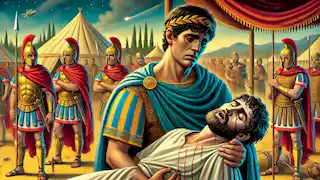
The Duel of Paris and Menelaus
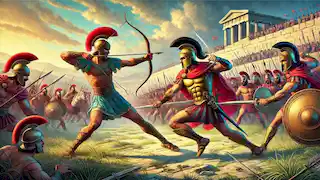
The Bravery of Hector
The Return of Achilles
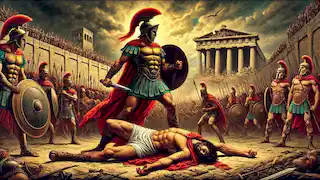
The Fall of Troy
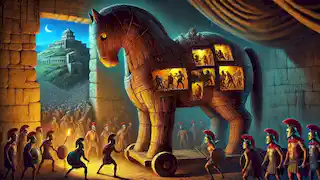
The Aftermath
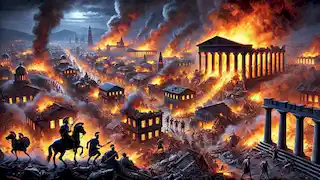
The Iliad
Reading Time: 5 min
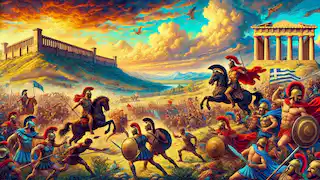
About Story: The Iliad is a Myth Stories from greece set in the Ancient Stories. This Dramatic Stories tale explores themes of Courage Stories and is suitable for All Ages Stories. It offers Historical Stories insights. A timeless epic of heroism, wrath, and fate. .

















